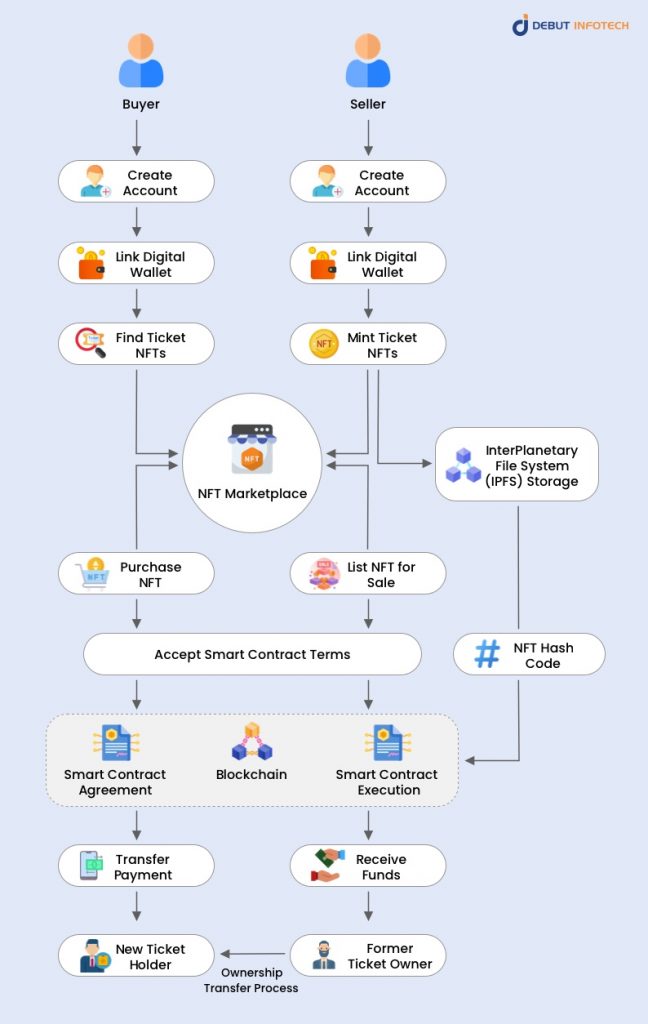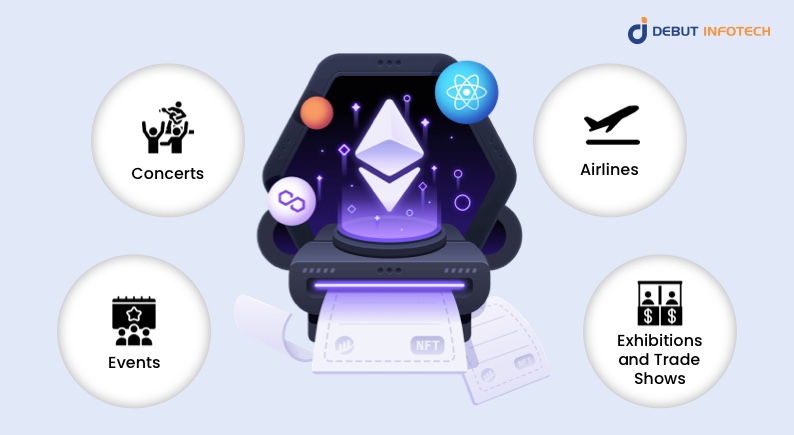Table of Contents
Home / Blog / NFT Marketplace
NFT Ticketing: Business Insights and Implications for the Ticketing Industry
June 14, 2024

June 14, 2024
The traditional ticketing industry, essential to event management, faces numerous challenges impacting both organizers and fans. Issues like fraud, counterfeiting, and scalping are common, leading to significant revenue losses and diminished consumer trust.
According to the World Economic Forum, the live events industry suffers over $1 billion in annual losses due to ticket fraud. Scalping, where tickets are resold at inflated prices, excludes genuine fans, while counterfeit tickets lead to entry denials and dissatisfied customers.
These ongoing issues highlight the urgent need for a secure and transparent ticketing solution. NFT ticketing, an innovative approach using blockchain technology, addresses these challenges directly. NFT tickets are unique, verifiable, and tamper-proof, ensuring the legitimacy and security of each ticket sold. This shift from traditional to NFT ticketing not only reduces the risks of fraud and unauthorized resale but also opens new opportunities for fan engagement and revenue generation.
NFT ticketing adoption is growing, with major players like Ticketmaster and the NBA integrating NFTs into their event strategies. Deloitte projects the global NFT ticketing market to reach $23 billion by 2027, underscoring its increasing acceptance and significant market potential.
If you’re considering integrating NFT ticketing into your organization, this blog delves into how NFT ticketing works, its benefits, and the various industries it can transform..
What is NFT Ticketing?
NFT ticketing issues event tickets as non-fungible tokens (NFTs) on a blockchain, serving as digital access passes for live or virtual events. Unlike traditional tickets using barcodes or QR codes, NFT tickets utilize blockchain technology, offering unique benefits. The immutable blockchain ledger records each transaction and ownership change.
The key distinction lies in the blockchain’s immutable ledger, which records each transaction and ownership change. This enables issuers to maintain a precise and transparent record of attendance, reducing fraud and counterfeiting. Additionally, blockchain technology facilitates new ways for organizers to engage with ticket holders. For example, issuers can send updates, host giveaways, or create token-gated websites and services accessible only to NFT ticket holders, enriching the overall event experience.
For ticket holders, NFT tickets offer more than just event access. They represent a permanent digital asset that is often interactive and can include exclusive content. These tickets can unlock special privileges, such as membership in exclusive fan clubs or access to unique experiences and content tied to the event. The combination of security, transparency, and enhanced engagement makes NFT ticketing a revolutionary approach, benefiting both organizers and attendees by transforming the traditional ticketing process into a more dynamic and interactive experience.
How Does NFT Ticketing Work?
NFTs, or non-fungible tokens, are unique digital assets stored on a blockchain. After being created on the blockchain, they can be sold digitally to customers, who then store them in secure digital wallets accessible from any device.
In the context of ticketing, event organizers can mint the required number of NFT tickets on their chosen blockchain platform. These tickets can be programmed with a set price or put up for auction, allowing users to place bids.

When a customer purchases an NFT ticket from the ticketing company, a smart contract is automatically triggered once payment is received. This smart contract manages the transfer of the NFT ticket from the ticketing database to the buyer’s digital wallet.
The ticketing company also uploads the ticket information to the InterPlanetary File System (IPFS). IPFS generates a unique hash for each ticket, which is then stored in the database. The NFT tickets are created and uploaded to the designated NFT marketplace.
Owners of NFT tickets can resell them on the NFT marketplace. The ticket remains in a smart contract, and once a new buyer purchases it, the smart contract triggers the transfer of payment to the original owner and the NFT ticket to the new buyer automatically.
What are the Advantages of NFT Ticketing?
Leveraging blockchain technology, NFT ticketing introduces a transformative approach to event ticketing, offering numerous benefits. Here’s an in-depth look at the advantages of NFT ticketing:
- Enhanced Security
NFT tickets are stored on a blockchain, which inherently provides a high level of security due to its decentralized and immutable nature. This means that once a ticket is created, it cannot be altered or duplicated, significantly reducing the risks of fraud and counterfeiting. Traditional tickets, whether paper-based or digital, are susceptible to forgery. In contrast, NFT tickets ensure that each ticket is unique and verifiable, providing peace of mind to both organizers and attendees.
- Ownership Verification
Each NFT ticket is a unique digital asset that can be easily verified for authenticity. Blockchain technology allows anyone to check the provenance and ownership history of a ticket, ensuring that only legitimate ticket holders gain entry to the event. This verification process is seamless and instant, enhancing the overall event experience.
- Transparency
Blockchain’s transparent ledger provides a comprehensive record of all transactions, including ticket sales and transfers. This transparency helps event organizers track the distribution and resale of tickets, preventing unauthorized sales and scalping. Attendees can also verify the legitimacy of their tickets, fostering trust and reliability in the ticketing process.
- Elimination of Scalping
Scalping, the practice of buying tickets and reselling them at inflated prices, is a significant issue in traditional ticketing systems. NFT tickets can incorporate smart contracts that regulate resale conditions, such as setting price caps or restricting transfers to prevent excessive reselling. This helps maintain fair pricing and ensures that tickets remain accessible to genuine fans.
- Enhanced Fan Engagement
NFT tickets offer more than just entry to an event. Organizers can enhance the fan experience by embedding exclusive content or perks within the NFT, such as backstage passes, digital collectibles, or access to special areas. These additional features create a deeper connection between the event and the attendees, increasing engagement and loyalty.
- Easy Transferability
The decentralized nature of blockchain allows NFT tickets to be easily transferred or resold on secondary markets. This provides flexibility for ticket holders who may no longer be able to attend the event, ensuring that tickets do not go to waste. The transfer process is secure and transparent, maintaining the integrity of the ticketing system.
- Cost Efficiency
Automating the ticketing process with smart contracts reduces the need for intermediaries and administrative overhead. This not only cuts costs for event organizers but also speeds up the ticketing process. Smart contracts handle the execution of ticket sales and transfers autonomously, ensuring accuracy and efficiency.
- Data Insights
Blockchain technology enables organizers to gather detailed data on ticket sales, ownership, and attendance. Analyzing this data provides valuable insights into audience behavior and preferences, helping organizers tailor future events to better meet the needs of their audience. This data-driven approach can enhance marketing strategies and improve overall event planning.
- Environmental Benefits
Digital NFT tickets reduce the reliance on physical ticket production, which has a significant environmental footprint. By eliminating the need for paper tickets, NFT ticketing contributes to sustainability efforts and reduces waste.
- Post-Event Value
After the event, NFT tickets can serve as digital memorabilia, holding sentimental value for attendees. They can also provide ongoing benefits, such as access to future events or exclusive content, adding long-term value to the ticket.
Applications of NFT Ticketing in Diverse Sectors

NFT ticketing is poised to revolutionize various sectors, including concerts, airlines, events, and exhibitions/trade shows. Here are the industries set to undergo transformation through NFT ticketing.
- Concerts
NFT for concert tickets is transforming the industry, with projections showing the global NFT market could reach $231 billion by 2030.
Companies like Live Nation and Ticketmaster are embracing this technology, enhancing ticket security and authenticity. These digital assets provide fans with more than just event access; they offer exclusive content, memorabilia, and even potential backstage passes.
For instance, Kings of Leon made waves by releasing their album as an NFT, which included special concert perks such as front-row seats, exclusive merchandise, and limited edition digital collectibles. As this trend gains momentum, NFT ticketing is poised to set a new standard in live events, ensuring concert-goers have a richer experience.
- Airlines
NFT ticketing for airlines is transforming the aviation industry, offering enhanced security and authenticity. Major airlines like Emirates and Lufthansa are leading the way by adopting this innovative technology.
According to a recent report, the adoption of blockchain technology, which includes NFTs, in aviation is expected to grow at a CAGR of 22.1% from 2021 to 2026. NFT plane tickets provide passengers with exclusive benefits such as lounge access, priority boarding, and unique in-flight experiences.
By integrating NFT ticketing, airlines ensure a more personalized and seamless travel experience. This technology also reduces ticket fraud and simplifies management, making it advantageous for both travelers and airlines. As more airlines embrace NFT ticketing, the future of air travel looks more secure and passenger-focused.
- Events
NFT ticketing has a broader application, covering a wide range of events beyond just music concerts. This includes theater performances, festivals, conferences, and any other type of event requiring entry tickets.
For instance, the sports industry is projected to see a significant impact, with blockchain potentially saving over $1 billion annually by reducing ticket fraud and increasing efficiency, according to a report by PwC. NFT tickets for events can offer similar perks but tailored to the specific type of event, such as VIP experiences, exclusive access to certain areas, or unique event-related collectibles.
Major festivals like Coachella and conferences such as the Cannes Lions International Festival of Creativity are already exploring NFT ticketing to enhance attendee experience. Additionally, the upcoming Tomorrowland festival in Belgium is set to incorporate NFT ticketing, further showcasing its growing adoption.
- Exhibitions and Trade Shows
NFT ticketing is revolutionizing exhibitions and trade shows by streamlining entry management and providing exclusive benefits.
Events like CES and Art Basel are exploring NFT tickets to offer exhibitors and attendees enhanced security and unique perks. NFT tickets ensure authenticity, reducing the risk of counterfeit entries. They can also include access to exclusive seminars, workshops, and digital swag bags, enriching the attendee experience.
For exhibitors, NFT tickets can provide detailed analytics on attendance and engagement, helping them tailor their presentations and interactions.
After exploring the diverse applications of NFT ticketing across various industries, let’s delve into the thriving ecosystem where these digital assets are exchanged – the NFT ticketing marketplace.
NFT Ticketing Marketplace: Facilitating Access to Exclusive Events and Experiences
The NFT ticketing marketplace has revolutionized the event industry by addressing issues like fraud and lack of transparency. By leveraging blockchain technology, it provides secure, unique, and tamper-proof tickets, ensuring a seamless and trustworthy ticketing experience.
Debut Infotech, an NFT marketplace development company, with a team of NFT experts and over 150 full-stack developers, excels in creating future-ready NFT ticketing platforms on advanced blockchain ecosystems. We combine Web3 and NFTs to develop platforms that facilitate seamless minting, tracking, management, and distribution of NFT-powered tickets.
Our NFT development services include:
- NFT ticketing platform development
- NFT wallet development
- NFT token development
- Fractionalized NFTs
We specialize in providing custom NFT ticketing app development solutions tailored to the unique requirements of your event and ticketing needs. Our offerings include:
- Custom Development
- Security and Scalability
- User-Friendly Interface
- Ongoing Support
If you are looking for NFTs-related services or want to build a customized NFT ticketing platform, contact us to learn more about our NFT market development services.
Talk With Our Expert
Our Latest Insights
USA
Debut Infotech Global Services LLC
2102 Linden LN, Palatine, IL 60067
+1-708-515-4004
info@debutinfotech.com
UK
Debut Infotech Pvt Ltd
7 Pound Close, Yarnton, Oxfordshire, OX51QG
+44-770-304-0079
info@debutinfotech.com
Canada
Debut Infotech Pvt Ltd
326 Parkvale Drive, Kitchener, ON N2R1Y7
+1-708-515-4004
info@debutinfotech.com
INDIA
Debut Infotech Pvt Ltd
Sector 101-A, Plot No: I-42, IT City Rd, JLPL Industrial Area, Mohali, PB 140306
9888402396
info@debutinfotech.com



Leave a Comment